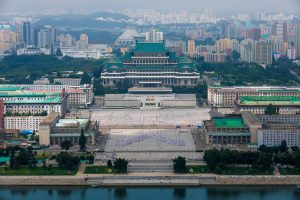In 2017, following a series of North Korean missile launches that included the debut of the Hwasong-14 intercontinental ballistic missile, the U.S. unsuccessfully pressed its treaty ally Thailand to take action beyond denouncing the Kim regime and complying with sanctions under the United Nations framework. This meant clamping down on North Korean-linked enterprises operating in Thailand.
Now that geopolitical realities are ominously contested, with North Korea getting a security guarantee of sorts from Russia, its nuclear provocations are likely to grow more audacious. Harsher sanctions are on the cards, and Thailand could very well face renewed and increased pressure to forge a bulwark against Pyongyang. Nothing good would come from such calls.
Fundamentally, Thailand has no vested interest in the conflict on the Korean Peninsula and seeks to preserve relations with both Koreas. Without substantial stakes, there’s little resolve for action. Under more conducive geopolitical dynamics and domestic conditions of the early 2000s, Thailand, together with the Philippines, was instrumental in institutionalizing North Korea within the ASEAN Regional Forum. Their main motivation, however, was to restore ASEAN’s leadership credibility, which had been damaged by the 1997 Asian financial crisis. However, this progress was short-lived. Once it became clear that major powers with more skin in the game favored the exclusive Six-Party Talks to curb North Korea’s nuclear ambitions, ASEAN’s sidelining was unavoidable.
Thailand’s policy toward the North has therefore become underpinned by a high degree of pragmatism: it has engaged under favorable circumstances and stepped back to join the sanctions regime when needed, all while ensuring that bilateral relations are not totally jeopardized.
As geopolitical volatility heightens, Thailand’s determination to steer clear of involvement in the Korean Peninsula conflict hardens. “It’s their business,” then Thai Prime Minister Gen. Prayut Chan-o-cha said after North Korea claimed to have tested a hydrogen bomb – potentially 1,000 times more destructive than an atomic bomb – for the first time in January 2016. Similarly, in resisting U.S. pressure to target North Korea-linked businesses in 2017, Prayut framed North Korea’s nuclear challenge as a “global issue” far beyond Thailand’s reach.
One can expect similar responses from the current Paetongtarn Shinawatra government. Rhetorically, its foreign policy emphasizes non-involvement in international disputes. Practically, Paetongtarn faces greater foreign policy challenges than Prayut did. These include multi-faceted threats from neighboring Myanmar, the management of Thai workers in the tumultuous Middle East, and the creeping militarization near Thai territorial waters.
The fluid nature of the relationship, then, weakens the assertion that Thailand has meaningful leverage over North Korea. There’s no denying that the North was once economically reliant on Thailand. The years leading up to the fateful 2006 nuclear test saw North Korea importing significant volumes of rice and computer parts, among others, from Thailand. In 2005, Thailand became North Korea’s third-largest trading partner after China and South Korea.
But those days are long gone. Since 2006, trade with North Korea has contributed only trivially to Thailand’s total trade. During the first months of 2017, a period of intense international scrutiny, Thailand’s trade with North Korea made up just 0.0004 percent ($1.61 million) of its overall trade. Unaccounted North Korean-linked businesses in Thailand, meanwhile, are regarded by Thai authorities as too minor to matter. Going after them would do little but risk triggering unnecessary bilateral tensions.
One might be tempted to argue that the information about these businesses is intentionally concealed. Even so, this likely has more to do with masking domestic corruption than pursuing covert agendas with North Korea. Any perceived leverage Thailand has is further diminished by its absence of military ties and diplomatic protection to North Korea. If decades of stringent global sanctions have failed to make the North yield, then Thailand has zero hope. The bottom line is that North Korea’s commitment to being recognized as a nuclear state far outweighs any associated costs.
The real cost of sanctions, unfortunately, is borne by ordinary citizens, which likely contributes to defections. Thailand, against its wishes, has become the passage of choice for 90 percent of North Korean defectors traveling through Southeast Asia – the most common escape route – in order to seek asylum in South Korea. This is because although Thailand is a non-signatory to the U.N. Refugee Convention, meaning that it can resort to deportation without facing legal repercussions, the unspoken practice has been to send North Korean “illegal immigrants” to South Korea. Such an arrangement speaks volumes about Thailand’s prioritization of ties with Seoul over Pyongyang. It also complements the Yoon Suk-yeol government’s unification approach, which promotes North Korean defectors’ quests for freedom and facilitates the support necessary for their assimilation into South Korea’s liberal society.
So, beyond sanctions, Thailand is already risking diplomatic complications with North Korea by favoring South Korea on an issue it has little interest in but has been thrust into. Given this dilemma and other previously discussed points, pressuring Thailand to go the extra mile to target North Korea would be counterproductive. At best, it would leave a sour taste in Thailand’s mouth. At worst, Thailand might feel that its foreign policy choices are being disrespected and unduly restrained, opening up a deeper schism in the Thailand-U.S. alliance.

































